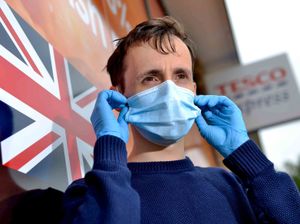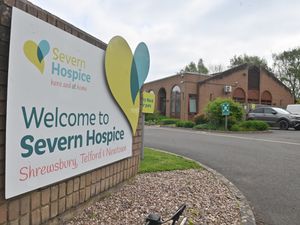New face mask laws come into force - but what are the rules?
Today is the day face coverings become mandatory in shops and supermarkets, as the Government tries to limit the spread of coronavirus.

Government advice says that anything which covers the nose and mouth safely and fits securely around the side of the face can be used, including dedicated masks, scarves, bandanas or religious garments.
It said: "Face coverings are instead largely intended to protect others, not the wearer, against the spread of infection because they cover the nose and mouth, which are the main confirmed sources of transmission of virus that causes coronavirus infection (Covid-19)."
People who fail to wear a mask in shops could be fined up to £100, or £50 if they pay within 14 days.
The rules will be enforced by the police, not shop workers, and only ''as a last resort''.
There are exemptions to the rules which include "young children under the age of 11; not being able to put on, wear or remove a face covering because of a physical or mental illness or impairment, or disability; if putting on, wearing or removing a face covering will cause you severe distress; if a police officer or other official requests you remove your face covering".
The full list of exemptions can be found on the Government website.
'Why now?'
Carl Bailey works at Challenging Perceptions in Telford, offering mental health support to young people, and he said he was not impressed by the Government's position.
"I don't agree with them. Why now, months after lockdown?
"It's going to be an inconvenience – for one, for costs.
"The Government are very vague about the exemptions. If you have mental health issues you don't have to wear one, but they don't specify what issues they mean. Is it anxiety, depression?
"If you have only got a few masks then you can't go to the shops as often.
"I've seen masks for sale, £6 or £7 for five [disposable] masks. People aren't going to be able to afford that."
Over the border, the Welsh government has not made face masks compulsory but is "advising" that masks made up of at least three layers of material are used in circumstances where social distancing is impractical.
The guidance from the Welsh government said: "The evidence remains clear that the most effective way to protect yourself and others from infection is to follow social distancing rules, avoid touching surfaces and your face, and wash your hands regularly.
"Face coverings are not a substitute for these measures, but in some circumstances where it might be difficult to stay 2m away from others, we are advising the use of three-layer, non-medical face coverings."
Masks have been mandatory in shops in Scotland since July 10.
Face covering Q&A
The key questions answered as the new laws which could see people who flout the rules get slapped with a fine come into force.
What has changed?
New laws called The Health Protection (Coronavirus, Wearing of Face Coverings in a Relevant Place) (England) Regulations 2020 have been published and will be brought into force on Friday.
– What does the law say?
No-one can go enter certain buildings like shops without a face covering – which covers your face and nose – unless they have a reasonable excuse.
Face coverings must be worn in: shops and shopping centres; banks; building societies; credit unions; short-term loan providers; savings clubs and currency exchange offices; anywhere that transmits money by cash or cheque; post offices.
A reasonable excuse includes: where a person cannot put on, wear or remove a face covering because of physical or mental illness, impairment or disability; when accompanying someone who relies on lip reading; to avoid or escape harm or injury to themselves or others; in order to eat and drink or take medication.
Are there any exemptions?
Yes.
The rules do not apply to children under the age of 11, employees working in the business in question or public transport staff, police officers, other emergency workers and officials.
Premises which are exempt include: restaurants with table service and bars, including those in hotels or members’ clubs; pubs; libraries; law firms; medical and dental practices; vets; cinemas; theatres; museums and galleries; aquariums, indoor zoos or visitor farms, or other indoor tourist, heritage or cultural sites; nightclubs; bingo halls; concert halls, public halls; conference centres; indoor fitness studios; gyms; leisure centres; indoor swimming pools; water parks; bowling alleys; funfairs; theme parks; amusement arcades; indoor soft play areas; indoor sports arenas; casinos; hotels; spas; beauty salons and hairdressers; tattoo and piercing parlours; storage centres; funeral directors; photography studios and auction houses.
What happens if I break the rules?
You can be told to put on a face covering or leave the premises by police or transport officers.
Police officers can escort someone from a building for refusing to follow the rules and can use reasonable force if necessary.
You could be fined £100, reduced to £50 if paid within 14 days, or even prosecuted.
How long will the rules be in force?
The rules must be reviewed by the Government within six months of the law being brought into force, which is January 24 2021.
Ultimately the law expires after a year unless the Government scraps it beforehand.




